#rape of lucrece
Explore tagged Tumblr posts
Text
Politeuphuia, Wits Common-wealth. (another copy!)
Politeuphuia, Wits Common-wealth 345G 345G Over the last twenty years I have been lucky enough to have had and sold all of the “Wit’s series” : Wits commonwealth, Published first in 1597, as the first in a series of which Mere’s “Palladis tamia”( I had only ten pages), 1598,was the second, “Wits theater of the little world,” by Robert Allott, 1599, the third, and “Palladis palatium, wisedom’s…

View On WordPress
#Antiquarian books#early printed books#Elizabeth I of England#Elizabethan era#Huntington Library#John Bodenham#Merry Wives of Windsor#Nicholas Ling#Rape of Lucrece#Rare Book#Robert Allott#Shakespeare#United States#WIT
1 note
·
View note
Text
Bro i read Aura by Carlos Fuentes again yesterday (had read it in school when i was 15) and it was so good what the hell. This is a sign that if you have not nurtured your love for literature in a while go ahead and read something insanely good it will make you feel so Alive
#yea philosophy/arti critique/composers thoughts/music analysis is really elating#but itd been so long since i'd read something like for its own artistic merit#last thing i think was maybe in september when i read shakespeare's the rape of lucrece#man i should read more stories and poems and novels again :)#broooo Aura was just so good
2 notes
·
View notes
Text

The Rape of Lucrece, William Shakespeare.
2 notes
·
View notes
Text
Shakes-tourney, Round 3
An excerpt from The Rape of Lucrece [Warnings: sexual threats/coercion]
youtube
An excerpt from Troilus and Cressida
youtube
1 note
·
View note
Text
On Lucrece's Honor
It is on nights like these when I think about how humans have always looked to media as comfort, escapism, and the lens through which to process one's own trauma. There are the obvious examples- Dante writing of his journey to purge himself of sin and re-contextualizing hell with allusions to the pagan poets, Marcus Aurelius populating his Meditations with references to his contemporaries- but none feels as modern to me as The Rape of Lucrece.
To be certain, it is a difficult read. Unlike Shakespeare's plays, his long-form poetry tends to be rather grueling and tedious to make one's way through, even if you look for elegant turns of phrase here or there. The subject matter, likewise, is not for the faint of heart.
What I find modern, however, is how while the deed itself gets comparatively little time on the page, the majority of the narrative focuses on Lucrece and how she deals with her rape. She is never blamed for it (and her rapist very much is and thoroughly made out to be a damned villain) and when she does speak out, the other characters make sure to tell her that she's still pure, still worthy. And in Lucrece's monologue leading up to her accusation, she worries over what she should do.
In trying to decide whether to speak out against her rapist, she looks to the stories of women in similar positions- weeps for Philomel, left to fend with her tongue cut from her mouth, mourns alongside Hecuba as the fair Trojan queen is rendered silent in painted agony, never to move for the loss of her city's autonomy, wonders if Helen was ever given voice when she was made to fall in love with Paris. It is only after attempting to give voice to those stories that Lucrece herself promises to use her voice, where her sisters may not have been able.
Perhaps that's why it always blindsides me thatshe decides to ultimately take her life at the end. It has been said by other scholars that this was a necessary point- that, for a Roman woman, it would have been the more honorable thing to do than live.
I tend to prefer a different interpretation. That being, in a metatextual way, Lucrece's story is itself meant to serve the role that the stories of Philomel, Hecuba, and Helen do to her- that she is meant to encourage girls down the line to speak out, in whatever way they can for their time.
Though, perhaps that is my own bias speaking. I am a transgender man, and the spectre of womanhood still lingers. I still don't feel comfortable walking alone at night. I find a strange comfort in this story.
Perhaps there is just something comforting in the fact that for as long as girls worried about whether they would be heard in all of history, there were always people who would hear them.
#shakespeare#the rape of lucrece#rape tw#suicide tw#john j talks#or i suppose soapboxes#it makes me genuinely sad that administration said no to teaching this one this semester#i have alternate assignments at the ready! venus and adonis is also perfect for if any students would rather not engage with the themes of#well#but for those who have read it#i always feel like students have such insightful emotional insights#this is one that connects to them#moreso than any particular sonnet might#apologies for the darker subject matter#it's... not a time of year where i am given to light thinking#it's simply frustrating#just when you think you have a handle on your life... something happens#it's not like this was in my control in the first place but#i was nice to think that it was
9 notes
·
View notes
Note
The Targaryens are also similar to the semi-legendary Tarquinius family, the ancient kings of early Rome, down to similar-sounding names. Both were overthrown in reaction to a tyrannical king’s son’s actions with a married noblewoman (in the case of Sextus Tarquinus he raped Lucretia, in Rhaegar’s case, he officially abducted and raped Lyanna). The Tarquins were, like the Targaryens, not native to the place they ruled, being Etruscans.
I would say then that their similarities end at Rhaegar and Lyanna. but that's an interesting catch. I see what you're saying about the shared narrative. I admit I have to read more about Tarquin and Lucrece.
#roman history#ancient history#asoiaf asks to me#the targaryens#tarquinus#lucretia rome#media comparisons#rhaegar targaryen#lyanna stark#agot#agot comment#a game of thrones#The Rape of Lucrece
4 notes
·
View notes
Text
Slowly making my way through the works of Shakespeare. I've already read Romeo and Juliet, Macbeth, Hamlet, Much Ado About Nothing, A Midsummer Night's Dream, The Tempest, Julius Caesar and, earlier this year, Twelfth Night and Antony and Cleopatra.
#William Shakespeare#Poll#Othello#King Lear#As You Like It#King John#The Taming of the Shrew#The Merchant of Venice#The Life and Death of King John#Shakespearean sonnet#Venus and Adonis#The Rape of Lucrece
1 note
·
View note
Text
4/25/2024-4/29/2024: The Rape of Lucrece

Well, as advertised, it's mostly about Tarquin raping Lucrece. Fairly uncomfortable reading, Mr. Shakespeare!
Next up: The Sonnets
0 notes
Text
Blackout poem I made for school last year (of course I had to make it snape related)
Source text: "The Rape of Lucrece" by William Shakespeare

#mans cried away his pupils#jack cryptid art#mine#severus snape#snape#hp fanart#Harry potter#fanart#art#hp fandom#old art
413 notes
·
View notes
Text
Thank you for this information about Tarquin, truly appreciated ☺️.
Also, agree with what you said in the second paragraph.
Actually I just found out the book that I mentioned in my post because I saw a BAHLK meme and as a reader I got curious or intrigued about it. Now, I realized that it is really funny that I want to read a serious and challenging book because of a children's show.... what are the odds though 🤣
Just a random thought
Since Ben and Holly's Little Kingdom is one of my fave childhood shows. By that this show is so impactful to me that it makes me want to read about The Communist Manifesto or the work of Shakespeare where the name Tarquin comes from 😅
#the idea of someone being like 'hey why are you reading the communist manifesto and the rape of lucrece?' and you answer 'ben and holly'#is so funny to me tho lmqoo#thank you for answering#bahlk
20 notes
·
View notes
Note
two dumb questions: 1) how many characters in the tragedies kill their partners (homoerotic nemeses do count in this case) and 2 (the more important one)) are there enough to write a parody of the cell block tango
I don't know how long ago I got this, and I feel like the asker probably needed an answer fast! But I still like the question!
But I don't think there are many!
Othello killing Desdemona in OTHELLO. She's dead for real and I hate it.
2. Richard III killing Anne in RICHARD III. Bastard.
3. Aufidius killing Martius in CORIOLANUS
4.) Claudius accidentally poisoning Gertrude in HAMLET (while trying to poison someone else).
5). Iago killing Emilia in OTHELLO. Emilia's fantastic!!! I hate it!!!!
6). Posthuman sends a literal assassin after innocent Imogen in CYMBELINE. He's lucky the assassin changes his mind and warns her!! He went a step even further than Leontes, but like Leontes, he his romantic partner lived. Speaking of....
THE UN-SPECIAL MURDEROUS MENTIONS :
Leontes comes awfully close in THE WINTER'S TALE to killing Hermione! Fortunately, he's able to hold himself back, putting her on trial instead of an actual assassin. She lives!!! It's OK!!!! I actually like Leontes, in the end!
In many RICHARD II productions, Aumerle kills Richard. The murderer in the play, Exton, comes out of nowhere at the final second, and it's kind of a letdown. Whereas Aumerle disappears after trying to put teh King (with whom he also has a homoerotic connection), and then being forced to swear loyalty to Henry IV. So it's much more compelling if he does it!
Lucrece Killing Tarquin IN the THE RAPE OF LUCRECE (one of the narrative poems). He saw her as a romantic interest. He's her rapist, and she does not see him that way. She kills him!!. It's a well-deserved, satisfying moment. That could do interesting things in a CELL BLOCK TANGO parody!
More than I thought, actually! Enough to do a CELL BLOCK TANGO parody even without the Un-Special Mentions, if you include Posthumus on "attempted". Oh, damn, now I hope someone does it....
#daily snack#william shakespeare#shakespeare#hamlet#shakespeare couples#shakespeare's tragedies#shakespeare's histories#asks
8 notes
·
View notes
Note
tell us about your Shakespeare club, that sounds like a whole lot of fun
So I am bad with words these days, so I should clarify and say it's a club I'm in, and not my own event I'm running.
One of my best friends decided to read all of Shakespeare's works this year, and he wanted to turn it into a book club over discord. We read one Shakespeare play a week, so one act per weekday.
Currently we're reading Henry V, which I'm very excited about. The reading order is a bit out of whack, but he has a lot of cons to attend as a panelist, and one of the authors in the merchant's/merch areas, selling his books.
And so far we've read:
Richard III
The Comedy of Errors
The Taming of the Shrew
Titus Andronicus
Romeo and Juliet
Julius Caesar
The Two Gentlemen of Verona
King John
Richard II
Hamlet
Venus and Adonis (poem)
The Rape of Lucrece (poem)
Othello
Antony and Cleopatra
Love's Labour's Lost
Pericles
Sonnets 1-154
Cymbeline
King Lear
A Midsummer Night's Dream
The Merchant of Venice
Much Ado About Nothing
As You Like It
Troilus and Cressida
Coriolanus
All's Well That Ends Well
Measure for Measure
The Merry Wives of Windsor
King Henry IV, Part I
King Henry IV, Part II
(He's also running a Tolkien book club. So far we've read The Silmarillion, The Children of Húrin, and The Hobbit. He keeps my reading schedule super busy!)
5 notes
·
View notes
Text

order is almost completely arbitrary. the henriad is vaguely bundled together, and there's a general mix of popularity & genre. some are associated with holidays, which was kept. comedy* tragedy† history‡
JANUARY
twelfth night * on or around January 5th romeo and juliet † second week january all's well that ends well * third week king john ‡ fourth week
FEBRUARY
macbeth † first week february much ado about nothing * second week narrative poem time! A Lover's Complaint: third week corionalus † first week march
MARCH
sonnets 1-25: fourth week julius caesar † on or around March 15 measure for measure * third week march henry vi part one ‡ fourth week
APRIL
henry vi part two ‡ first week april comedy of errors * second week narrative poem Venus and Adonis: third week titus andronicus † fourth week
MAY
sonnets 26-50: first week may two gentlemen of verona * second week henry vi part three ‡ third week richard iii ‡ fourth week
JUNE
sonnets 51-75: first week june othello† second week narrative poem The Passionate Pilgrim: third week a midsummer night’s dream * (north hemisphere, on or around the summer solstice) or hamlet † (south hemisphere)
JULY
sonnets 76-100: first week july merchant of venice * second week king lear † third week tempest * fourth week
AUGUST
sonnets 101-125: first week august taming of the shrew * second week narrative poem The Rape of Lucrece: third week troilus and cressida † fourth week
SEPTEMBER
sonnets 126-154: first week september richard ii ‡ second week henry iv part one ‡ third week merry wives of windsor * fourth week
OCTOBER
narrative poem The Phoenix and the Turtle: first week october henry iv part two ‡ second week henry v ‡ on or around October 25 (st crispin's day) as you like it * fourth week october
NOVEMBER
antony and cleopatra † first week november cymbeline † second week pericles ‡ third week love's labour lost * fourth week
DECEMBER
timon of athens † first week december henry viii ‡ second week winter's tale * third week a midsummer night’s dream * (south hemisphere, on or around the summer solstice) or hamlet † (north hemisphere)
3 notes
·
View notes
Text
Shakespeare Weekend
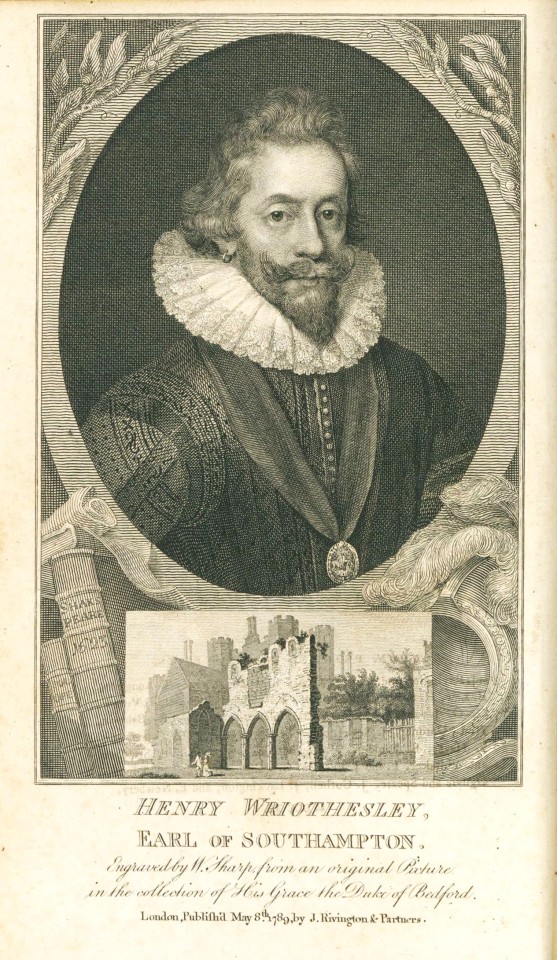
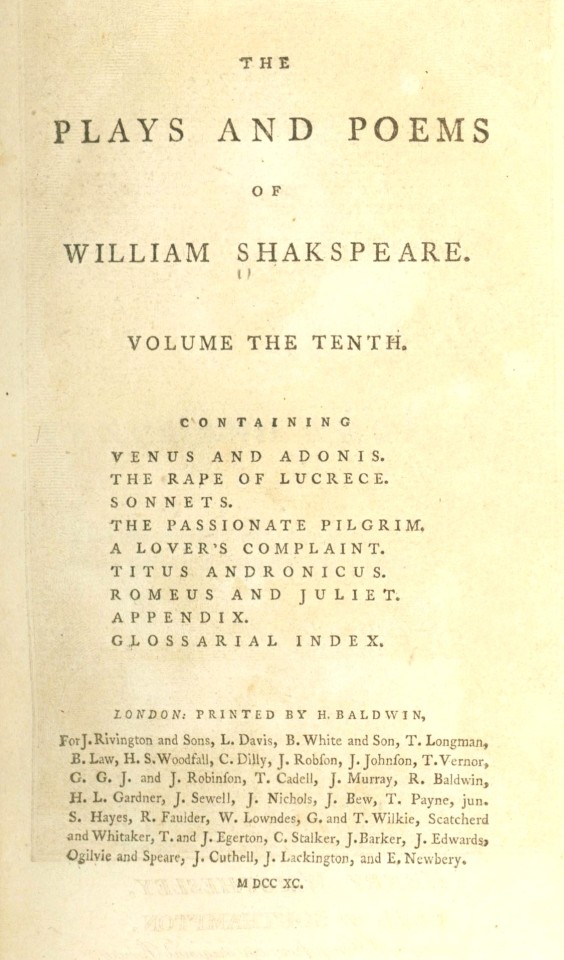
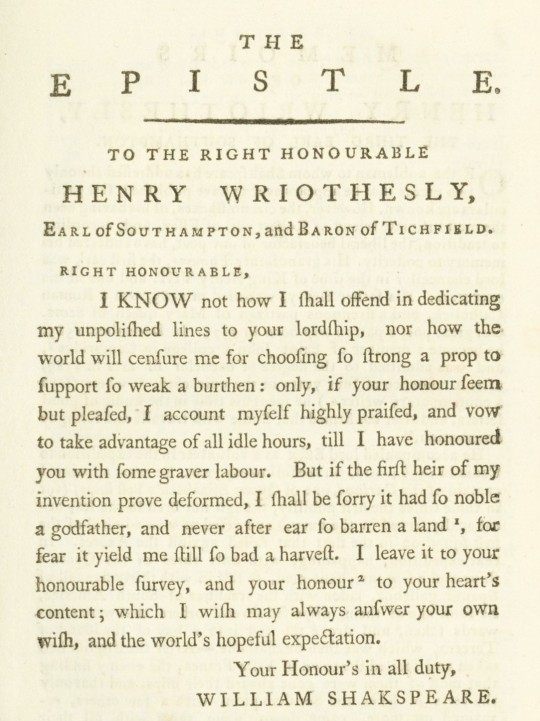
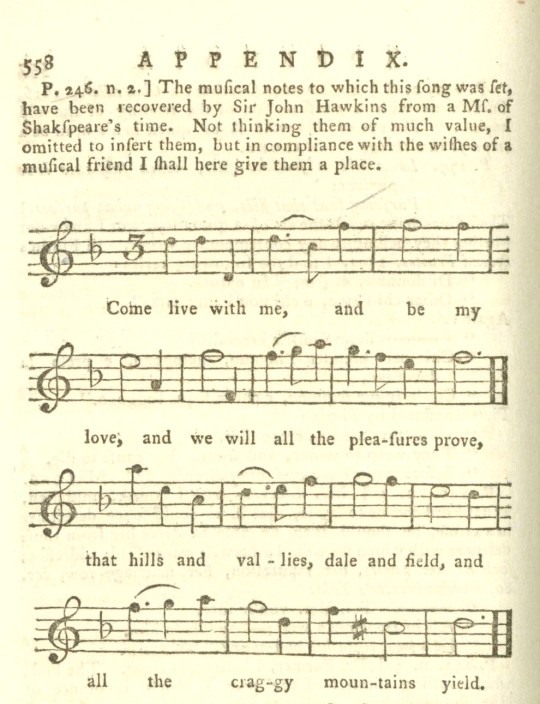
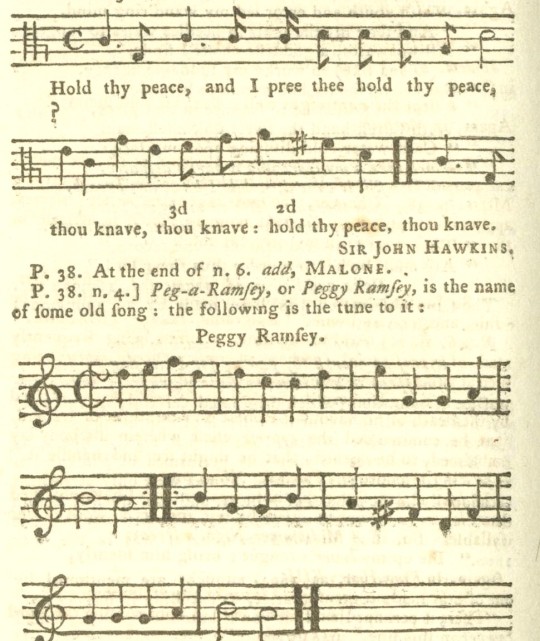

Edmond Malone’s (1741-1812) The Plays and Poems of William Shakspeare, in ten volumes, published in 1790 and printed by Henry Baldwin, begins its tenth volume with a full-page frontispiece of the 3rd Earl of Southampton, Henry Wriothesley (1573-1624) followed by a dedication to him written by Shakespeare and several verses written in Wriothesley’s memory by Shakespeare’s contemporaries before opening with Venus and Adonis. The frontispiece was engraved by William Sharp (1749-1824) from a painting by Dutch artist Michiel Janszoon van Mierevelt (1566-1641).
A second dedication to Wriothesley by Shakespeare appears before The Rape of Lucrece. While extravagant dedications were not unusual at the time, several scholars speculate about the relationship between the two men. English essayist Nathan Drake (1766-1836) proposed that the Earl was the Fair Youth of Shakespeare’s Sonnets and English poet Willam Davenant (1606-1668) chalked the adoration up to Wriothesley patronizing Shakespeare’s work.
Volume Ten concludes with a thorough appendix, including sheet music Malone inserted at the request of a “musical friend”, and a full glossarial index.
View more Shakespeare Weekend posts.
-Jenna, Special Collections Graduate Intern
#shakespeare weekend#william shakespeare#edmond malone#henry wriothesley#william sharp#Michiel Janszoon van Mierevelt#nathan drake#william davenant#engravings
9 notes
·
View notes
Note
You are convinced that Aemond raped Alys and your reasoning is "Alys Rivers was a war prize “proving” Aemond’s power and military prowess. If you are taken as a war prize, you are an object, a literal reward or prize. You have no ability to even give consent because your other option is violence/death. Aemond raped her and this son is a rape baby." Your words not mine. Then I click on your blog and you ship Rhaegar and Lyanna lol lets apply that logic to them now! The Greens suck but come on.
Disclaimer: I might edit this post a lot because I might realize some things to add.
1)
Did you know, anon, that the word “rape” in medieval society could either mean the sexual attack or just straight up taking a woman/girl away from her father/brother/husband’s control and authority? Or whenever a female laborer of a household has been taken out of her previous household, unlicensed by her lord?
Its roots come from the Latin word, “rapere” and its past participle “raptus”:
“the usual Latin word being stuprare "to defile, ravish, violate," which is related to stuprum (n.) "illicit sexual intercourse," literally "disgrace," stupere "to be stunned, stupefied" (see stupid). Latin raptus, past participle of rapere, used as a noun meant "a seizure, plundering, abduction”
Rape had the legal and cultural meaning of “property-taking”, sometimes more than when a someone forced a woman into sex. And it comes from ancient Roman culture, literature, and ideas medieval societies would be adopting into their own systems (Ovid's Fasti and Livy's History of Rome): The Rape of Lucrece.
Of which medieval or Reniassance writers have made use to create doubt and suspicion for the state of their various female character’s chastity. Why does such matter in those stories? A woman’s chastity is linked to nation building and male-alliances. Marriages were for alliance, resources and power -- not love. Lyanna was arranged to marry Robert because of power and resources and to strengthen/solidify the alliance already set up by Ned and Robert’s friendship before.
So when we go back to A World of Ice and Fire, which says:
“Brandon Stark, the heir to Winterfell, had to be restrained from confronting Rhaegar at what he took as a slight upon his sister's honor, for Lyanna Stark had long been betrothed to Robert Baratheon, Lord of Storm's End. Eddard Stark, Brandon's younger brother and a close friend to Lord Robert, was calmer but no more pleased. As for Robert Baratheon himself, some say he laughed at the prince's gesture, claiming that Rhaegar had done no more than pay Lyanna her due...but those who knew him better say the young lord brooded on the insult, and that his heart hardened toward the Prince of Dragonstone from that day forth.” (pg. 127)
We get the sense that the Starks percieved Rhaegar taking Lyanna and even just gifting her the crown of blue roses as defiling her female chastity. It wasn’t about her and what she wanted it was about Robert’s claim over her. And it was more about Ned’s ties to Robert and why he was sent to the Eyrie to be fostered in the first place, where he befriended Robert -- to create alliances amongst various families.
By contrast, Lyanna clearly did not want, respect, nor love Robert. When we read AGoT and keep track of Lyanna and Rhaegar (not their families, but themselves), we see that Lyanna wanted Rhaegar over Robert and they formed a genuine relationship.
She expressed to Ned:
"Robert will never keep to one bed,” Lyanna had told him at Winterfell, on the night long ago when their father had promised her hand to the young Lord of Storm's End. "I hear he has gotten a child on some girl in the Vale." Ned had held the babe in his arms; he could scarcely deny her, nor would he lie to his sister, but he had assured her that what Robert did before their betrothal was of no matter, that he was a good man and true who would love her with all his heart. Lyanna had only smiled. "Love is sweet, dearest Ned, but it cannot change a man's nature.”
(A Game of Thrones; Eddard IX )
AND
"You never knew Lyanna as I did, Robert," Ned told him. "You saw her beauty, but not the iron underneath. She would have told you that you have no business in the melee."
(A Game of Thrones; Eddard VII)
AND
Robert reached for the flagon and refilled his cup. "You see what she does to me, Ned." The king seated himself, cradling his wine cup. "My loving wife. The mother of my children." The rage was gone from him now; in his eyes Ned saw something sad and scared. "I should not have hit her. That was not … that was not kingly." He stared down at his hands, as if he did not quite know what they were. “I was always strong … no one could stand before me, no one. How do you fight someone if you can’t hit them?” Confused, the king shook his head. “Rhaegar … Rhaegar won, damn him. I killed him, Ned, I drove the spike right through that black armor into his black heart, and he died at my feet. They made up songs about it. Yet somehow he still won. He has Lyanna now, and I have her.” The king drained his cup.”
(A Game of Thrones; Eddard X)
So, if Robert, a canon and confirmed serial rapist (Cersei) and sexual abuser of children (that 14 year old sex worker that even Ned was like “...bro”) by the time he was 40ish, could not see that Lyanna did not want him and only thought of how pretty she was....while Rhaegar gifted her the crown of roses for her participation and victories at the Harrenhal tourney (however politically stupid it was)...who’s the true rapist here? Would Robert have respected Lyanna’s indifference to him if they did get married? Fuck no.
So if there were any persons defining and saying Lyanna was raped, it was never her or about sexual rape but those who would have benefited more from Lyanna marrying Robert & about “stealing” virginity.
And if you wonder why I bother to introduce medieval society when this is a fictional story with European medieval-inspired and not-so-differently modeled infrastructures and ideologies.....I can’t help you.
2)
Lyanna was 16 when they left for the Tower of Joy and had Rhaegar’s child, and they met when she was 15 at the Harrenhal tourney.
We remember that she was betrothed to Robert before she turned 16, and Robert was 19/20 at the Harrenhal tourney.
Rhaegar was 22/23 at the tourney and 23/24 when he went with Lyanna to the Tower of Joy.
Lyanna, by real, American, modern standards, is a minor/child by the time she’s pregnant with Rhaegar’s kid, but she’s an adult by the Westerosi age of majority. And she’s past marriageable age.
To totally ignore that noble women of both real life and Westeros actively were treated as adults and like Rhaenyra Targaryen, and participated in politics as if they were adults is to:
deny any reality of their political and psychological autonomy and ability to reason
suppose that the man she chose broke a law or principle that is then recognized as a crime
....but if you go back to how I bring up the definition of “rape” and what that means for male-alliances, then you should realize that the crime that anyone would have thought what happened was that Lyanna was not passed into Robert’s authority (and out of her father and brothers’) and Rhaegar intercepted that licensed transfer.
3)
Robert is Rhaegar’s foil. Rhaegar displays an sense of responsibility and emotional intelligence (if not always a political one) that Robert simply lacks and never bothers to develop.
A foil is:
a literary device designed to illustrate or reveal information, traits, values, or motivations of one character through the comparison and contrast of another character. A literary foil character serves the purpose of drawing attention to the qualities of another character, frequently the protagonist. This is effective as a means of developing a deeper understanding of a character by emphasizing their strengths and weaknesses. In addition, a literary foil allows writers to create a counterpart for the protagonist that puts their actions and choices in context.
And you can look up Rhaegar’s characterization by clicking HERE (of what I collected). But the universal consensus (except for Robert, but fuck him) is that Rhaegae was generally both a good and impressive person. He was loved by most and even Robert didn't dislike him until he gave Lyanna the crown and stepped on his "turf".
It is actually more in Robert’s than Rhaegar’s character to rape. Robert thinks Rhaegar raped Lyanna (the other meaning) because he would have raped her. Because to him, "rape" is unallowed transfer of a woman's body, not about her consent. He feels every man naturally thinks and would treat Cersei/Lyanna as he does/would have. (Meanwhile, can we say that his own friend, Ned, that he would do that to a woman?)
Rhaegar was a gloomy person and mimics the Byronic Hero trope; Lyanna was a lot more positive and vibrant, mimicking the Rebellious Princess or Spirited Young Lady tropes:
The Rebellious Princess is usually a teenager, typically brash (since it goes hand in hand with being rebellious). If she's not the hero, quite often she's the hero's love interest. This will sometimes invoke Marry for Love not only as another way for her to rebel, but to also get out of an Arranged Marriage. She usually qualifies as a Royal Who Actually Does Something.
Thus these two embody Forbidden Love, Opposites Attract, and dabble into Good, Bad Adultery.
Edit: I just realized that Rhaegar also fits into the Royal Who Actually Does Something Trope. Also, he and Lyanna are the inversed versions of their traditional gendered roles: Rhaegar becomes the musical, singing quieter lady imbued with remembrances for a time past while Lyanna actively participates in tourneys and masculinized quests/journeys like the Prince Charming/Knight in Shining Armor. Subversion of narrative and gender tropes!
Rhaegar loved Lyanna for:
her bravery and passion
protecting those needing to protecting
her determination to stand up for what she thinks is right despite constrictions placed on her bc of youth and gender
positivity
Lyanna loved Rhaegar because:
he had much more of a sense of responsibility and the sense of grief that comes with his need to "fix" certain wrongs in their current society (thus was more...he cared more than any other person, regardless of gender, about what it means to rule apart from having power)
that that responsibility went even beyond her
that that sense of responsibility went further than most noblemen’s while not trying to change or repress her, nor disregard her entire personality for his own sense of power or (for him, nonexistent) fantasies of her person
his passion
And tropes =/= “trite” or cliche. You can think of them as building blocks for themes, storylines, and characterizations.
Martin has painstakingly made sure to convey that their story and deaths are tragic not just for them and their families, but for Rhaegar’s ambition to remodel and begin to reverse the damages done in Westerosi history after having learned of the prophecy.
4)
What defines a war prize, anon? Assuming you’ve read the post you seem to be referring to (this ONE), you should know that they are people or things that a warrior claims or is given as a reward for victory or conquest during/after a war/a battle.
Lyanna and Rhaegar form a romantic bond and they go off together before Rhaegar ever actually battles anyone or there was a war happening. Before Robert rebels and lords begin to gather weapons and troops.
It begins with him giving her the crown for Queen of Love and Beauty at the Harrenhal tourney, passing his own wife. You can look at all the posts I have tagged “lyanna and rhaegar”, or click HERE for more.
So just by definition of a war prize, Lyanna was never a war prize.
#lyanna and rhaegar#asoiaf asks to me#robert's rebellion#medieval terms#medieval society#rhaegar's characterization#lyanna stark#lyanna stark's characterization#robert baratheon#robert baratheon's characterization#war prize#rhaelya#classical literature#agot comment#a game of thrones#asoiaf#AGoT
71 notes
·
View notes
Text
12 notes
·
View notes